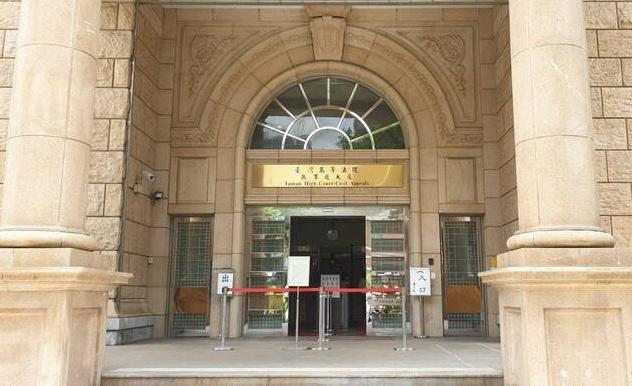A reporter and professor were sentenced to nine and six months in prison respectively and stripped of their civil rights for two years by the Taichung branch of the High Court today for fabricating election polls during the last presidential election.
Reporter Lin Hsien-yuan (林獻元) allegedly accepted 130,000 yuan (US$17,936) from the Chinese Communist Party and worked with Taichung-based Tunghai University professor Su Yuan-hwa (蘇雲華) to disseminate fake polls that would influence election results.
The dissemination of fake opinion polls misleads voters and endangers the nation’s sovereignty and democracy, prosecutors said, accusing Lin and Su of contravening the Anti-infiltration Act (反滲透法).

Photo: Chang Jui-chen, Taipei Times
The Taichung District Court ruled this law did not apply, and instead sentenced Lin and Su to eight and four months in prison respectively for contravening the Presidential and Vice Presidential Election and Recall Act (總統副總統選罷法).
The prosecution was dissatisfied with this ruling and appealed.
The Taichung branch of the High Court issued a second ruling today, stating that the defendants contravened both acts and increased their sentences.
The High Court also granted Su a two-year probation.
It did not provide additional reasoning for the ruling, which can be appealed.
Prosecutors initially accused the defendants of following instructions from China’s Taiwan Affairs Office spokesman Chen Binhua (陳斌華) to publish nine false presidential election polls.
In the first trial by the district court, Su admitted to the crimes, while Lin said that his manipulation of polling data was not politically motivated and that the money he received was for purchasing teapots on behalf of his Chinese friends.
As Lin had been engaged in cross-strait journalism for a long period, the court ruled that interactions with Chinese reporters and officials were understandable and did not indicate he was following their commands.
The false polls released before Nov. 24, 2023, were deemed not punishable, as candidates had not yet registered at that time.
The two polls fabricated after that date were ruled to have contravened the Presidential and Vice Presidential Election and Recall Act.
The district court also ruled that Lin contravened the Company Act (公司法) by borrowing money from a friend to meet the minimum capital threshold required to found his media company.
The High Court maintained this ruling.

Taiwan is stepping up plans to create self-sufficient supply chains for combat drones and increase foreign orders from the US to counter China’s numerical superiority, a defense official said on Saturday. Commenting on condition of anonymity, the official said the nation’s armed forces are in agreement with US Admiral Samuel Paparo’s assessment that Taiwan’s military must be prepared to turn the nation’s waters into a “hellscape” for the Chinese People’s Liberation Army (PLA). Paparo, the commander of the US Indo-Pacific Command, reiterated the concept during a Congressional hearing in Washington on Wednesday. He first coined the term in a security conference last

Prosecutors today declined to say who was questioned regarding alleged forgery on petitions to recall Democratic Progressive Party (DPP) legislators, after Chinese-language media earlier reported that members of the Chinese Nationalist Party (KMT) Youth League were brought in for questioning. The Ministry of Justice Investigation Bureau confirmed that two people had been questioned, but did not disclose any further information about the ongoing investigation. KMT Youth League members Lee Hsiao-liang (李孝亮) and Liu Szu-yin (劉思吟) — who are leading the effort to recall DPP caucus chief executive Rosalia Wu (吳思瑤) and Legislator Wu Pei-yi (吳沛憶) — both posted on Facebook saying: “I

Sung Chien-liang (宋建樑), who led efforts to recall Democratic Progressive Party (DPP) Legislator Lee Kun-cheng (李坤城), was released on bail of NT$80,000 today amid outcry over his decision to wear a Nazi armband to questioning the night before. Sung arrived at the New Taipei District Prosecutors’ Office for questioning in a recall petition forgery case last night wearing a red armband bearing a swastika, carrying a copy of Adolf Hitler’s Mein Kampf and giving a Nazi salute. Sung left the building at 1:15am without the armband and covering the book with his coat. Lee said today that this is a serious

The Ministry of Economic Affairs has fined Taobao NT$1.2 million (US$36,912) for advertisements that exceed its approved business scope, requiring the Chinese e-commerce platform to make corrections in the first half of this year or its license may be revoked. Lawmakers have called for stricter enforcement of Chinese e-commerce platforms and measures to prevent China from laundering its goods through Taiwan in response to US President Donald Trump’s heavy tariffs on China. The Legislative Yuan’s Finance Committee met today to discuss policies to prevent China from dumping goods in Taiwan, inviting government agencies to report. Democratic Progressive Party Legislator Kuo Kuo-wen (郭國文) said